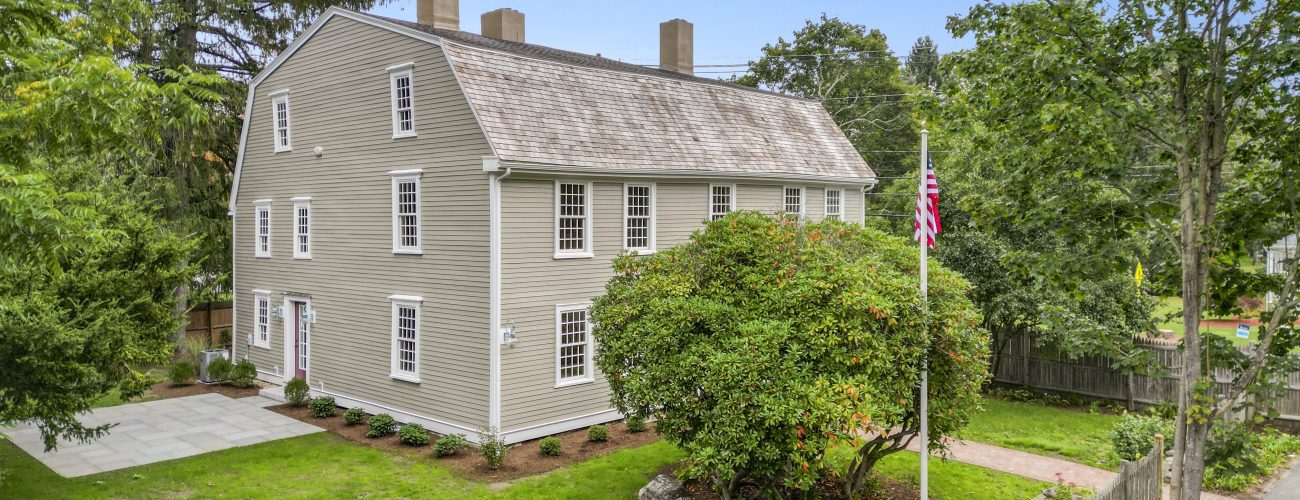
The 1715 James Putnam Jr Homestead – restored & marketed by C.P. Berry Homes
December 13, 2023Listed for sale – call for details.

The 1715 James Putnam, Jr. Homestead, 42 Summer St., Danvers, Massachusetts. This architectural gem has been meticulously restored by C.P. Berry Homes, with updates necessary for life in the 21st century. Located in the desirable St. John’s Prep neighborhood of Danvers. Call or email Mark 978.807.2954 Mark@CPBerryHomes.com for any additional information.
History of the Putnam-Pickering Home
This unique home, which is listed on the National Register of Historic Places, includes two early distinctive architectural styles under one roof. The original intact ca. 1715 “First Period” home was expanded on its south side around 1780 with a high style Georgian addition of four rooms and a grand staircase. The resulting “double house” covered by a traditional New England gambrel roof.
In 1715, James Putnam (1661-1727), yeoman and bricklayer, constructed a home for his son, James Jr.(1689-1763), also a yeoman and bricklayer, on 3.5 acres of land he purchased from Israel Porter on this country road in Salem Village, now Summer Street in Danvers. James Jr. married Ruth Hathorne (1694-1769) of Salem in 1715 and took title of the home in 1718. Ruth Hathorne is the daughter of Col. John Hathorne (1641-1717), judge and chief examiner of the Salem Witch Trials, and granddaughter of Thomas Gardner (1592-1674), Overseer of the “old planters” who landed in 1624 at Cape Ann and considered the first governor of Massachusetts.
After James Jr. died, the home was occupied by his son, Archelaus Putnam (1721-1786). Archelaus was a graduate of Harvard College and a selectman in Danvers in 1774. Brother James (1726-1798), also born in the house and attended Harvard, was a famed lawyer and teacher of John Adams. He served as the last royal Attorney General of Massachusetts and fled with British troops at the 1776 evacuation of Boston.
Archelaus Putnam Jr. (1744-1800) was the next owner of the property. The second son of Archelaus and Ruth (Flint) Putnam, he graduated from Harvard in the class of 1763 at age 18. Putnam was a noted physician practicing medicine from his home in Danvers.
In 1776, during the American Revolution, Putnam joined the cause for independence as a surgeon· serving in the regiment of his Harvard classmate, Colonel Timothy Pickering of Salem. He served with Pickering and later with General Benjamin Lincoln in 1777. When Putnam’s regiment was mustered out, he returned home to his medical practice and expanded the original first period home with a new Georgian period addition. In 1786, he married Abigail, the widow of Colonel Alexander Scammell who died at Yorktown. Abigail Scammell was the daughter of John and Abigail (Tufts) Bishop of Medford. In 1800, Archelaus died and is buried in Wadsworth Cemetery, just down Summer Street from his home.
After Putnam’s death, the homestead was leased to his friend Timothy Pickering from 1802-1804. Pickering, a “Founding Father” of the United States, was well known for his military skills, and in 1777 had been appointed the position as Adjutant General of the Continental Army by General ( George Washington. In 1780, he was made Quartermaster General. Pickering, an ardent Federalist, served in the cabinets of both George Washington and John Adams’s as Postmaster General, Secretary of War and Secretary of State.
While at the Summer Street property, Pickering experimented in “Scientific Farming”, served as Chief Justice of the Essex County Court of Common Pleas, and was appointed as United States Senator from the Commonwealth of Massachusetts.
James Augustus Putnam (1792-1862), the next owner of the property, married Sarah Marston (1795-1853) in 1820. They raised 4 sons and one daughter on the Summer St. farm. He and Sarah are buried in the Wadsworth Cemetery.
The Putnam family remained on the property until the late 1800s. By the 1880s, the property was owned by J. Perry. In the 1920s, Phoebe (Woodman) Caliga, cousin of John Greenleaf Whittier, who had lived nearby, bought the Putnam homestead, and “restored” it for a Tea House. The property has changed hands several times over the past century. In 2023, this architectural gem was meticulously restored with updates necessary for life in the 21st century.




